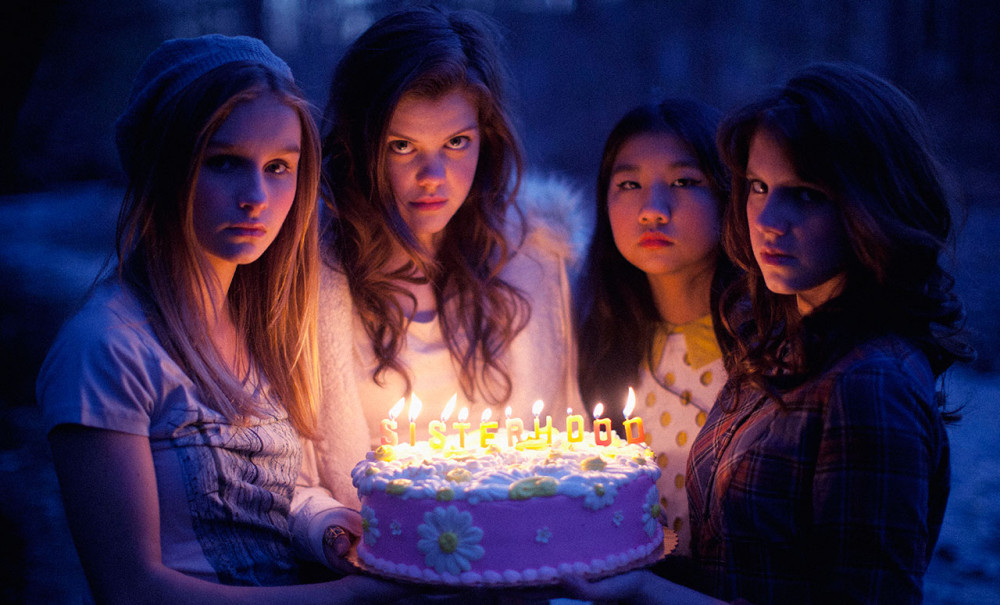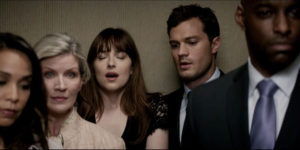
There’s something all too fascinating about watching the events that transpire in The Sisterhood of Night unfold; an ambitious, but shockingly simple, portrait of a modern town who experience a Crucible style witch hunt. That being said, there are no real witches in The Sisterhood, but there’s an abundance of angst, blogging, accusations, victimization, and friendship, amongst teenage girls.
The girls of Caryn Waechter’s debut feature are an interesting bunch, all of them acting just like one would expect teenagers to act: they blog, they spread rumors, they overreact. And it’s a testament to Waechter’s skill as a filmmaker and a writer that she never vilifies any of her characters, regardless of the sometimes foolish decisions they make. While the sisterhood is full of gals, there are four are the core of the narrative, all of whom seem to face their own set of problems at home and find solace in this little world they have. Catherine Huang (Willa Cuthrell) is struggling to deal with her dying mother in the hospital and her father taking care of her, while Lavinia Hall (Olivia DeJonge) is in love with a boy at school and can’t quite come to terms with her separated parents, specifically her dating mother. And then there’s the two gals the film focuses on the most: churchgoer/blogger Emily Parris (Kara Hayward) & Sisterhood founder Mary Warren (Georgie Henley).
Their constant bickering is established from the get-go, with a fucked-up audition being the basis of it all, but life for the people of this small town – which was once called an “archetype of happy suburbia” – spirals out of control when Emily reveals the existence of the Sisterhood and begins to dish out accusations of what they do in the night. In the woods, we witness Emily drop her phone after taking a picture, and immediately cut to her in a bed with a wound on her palm. How’d she get it? The Sisterhood did it. They cut her, they touched her, they did all sorts of unspeakable things. Except, well, maybe they didn’t at all.
As a viewer, we’re not meant to know whether or not it’s actually true, but it sets itself up for the obvious within a few minutes of the drama starting. That predictability isn’t so much a curse on the film though, in part because even though one can see the ending coming, it’s all about the themes that writer Marilyn Fu and Waechter are presenting in their work. And in its aesthetic presentation, we sometimes receive something absolutely gorgeous to watch in Sisterhood – lovely photography and The Crystal Method/Tobias Enhus’ music working well together – with its final moments in particular prove breathtaking in a strange way. In fact, it’s arguably the best-looking Kickstarter feature I’ve had the pleasure of watching, even though it does something a little strange with its editing for a grand portion of the film. Sisterhood cuts back and forth between documentary-style presentation of the past events – including talking head recordings, ridiculous dramatizations, a series of photographs, newspaper cutouts, and blog entries galore – and the familiar storytelling we get from straight-forward works of fiction, making for an admittedly strange mix, and one that doesn’t always work.
But regardless of its strange presentation, The Sisterhood of Night nails exactly what these characters would actually do in the situation they’ve been placed in. The same kind of wild overreaction about sexual abuse that populated Thomas Vinterberg’s The Hunt is present, specifically in the parents of every child involved. And yet, it’s accompanied by some more intriguing explorations than whether or not we should believe a man on his word alone, all done through these teens. The girls say the kind of things teen girls would say (though “You look a little Courtney Love today, before she went red carpet” seems a little dated for this period), but more importantly, they actually treat each other just like teenagers do – in ways both positive and negative.
It’s not all takedowns and cattiness here, because Waechter fully intends to make these girls more than caricatures, and she does this by showing both how empathetic they can be and how quickly a situation can escalate when kids believe they’re more grown up than they are. One of the most fascinating, and unexpected, is the way Emily is confronted with her cult revelation triggering a series of young women to reveal that they’ve been sexually abused in the past on her very blog. By no means is it perfectly slipped into the film, and there will no doubt be some to criticize it for wanting to handle something this heavy, but to have one of the film’s main characters be forced to confront her lies by being placed in front of women who were genuinely abused is a bold move.
Released in the same month as Unfriended – a film that wishes it was as good at exploring how genuinely damaging internet culture/cyberbullying can be as this one was – The Sisterhood of Night deserves to be seen for what it is: an emotional drama that actually understands teen culture and what it means to have an outlet for your feelings. As much as it offers up that Crucible all too easily as a comparison point for narrative discussion, this is at its core a film that understands just how powerful female friendship is and how determined society is to shame young women for finding a meaning of expression that’s misunderstood; something so rarely shown on screen.
—
Directed by Caryn Weachter; written by Marilyn Fu; based on a short story by Steven Millhauser; starring Georgie Henley, Kara Hayward, Willa Cuthrell, Olivia DeJonge, Kal Penn, Laura Fraser; 104 minutes.
The Sisterhood of Night is currently undergoing a limited theatrical release and available on Amazon Instant.



 Derek
Derek
 Isabelle
Isabelle